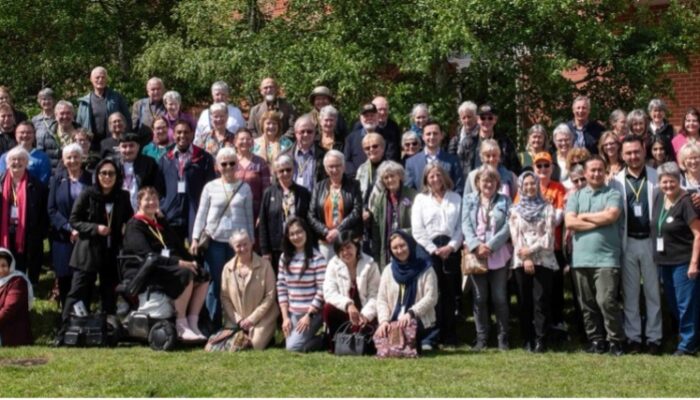2024 Rural Australians for Refugees National Conference, Victoria, Australia
Australia is renowned for its harsh treatment of refugees and asylum seekers despite being a multicultural country with a long-term refugee resettlement program. In November 2024, the Australian government passed legislation to give the immigration minister increased and extensive deportation powers.
Countering the perception that the Australian community does not support refugees is Rural Australians for Refugees (RAR), a network of 75 voluntary rural and regional groups who advocate for improved policies for the treatment of people seeking refuge and asylum in Australia. RAR advocates for a just and inclusive society.
Every two years RAR conducts a national conference to bring together RAR groups, refugees and people seeking asylum, and other stakeholders to share stories, promote community programs and develop strategies for future advocacy work. This year’s conference was held from 12-14 October 2024 in a Victorian regional town with over 200 attendees. The theme for the conference was ‘Communities Shaping Change’. Speakers featured prominent refugee advocates including Behrouz Boochani, Gillian Triggs (RAR patron), and David Manne from Refugee Legal. Participants included community members of RAR groups and refugees and people seeking asylum with a strong presence of refugees from Afghanistan and Sri Lanka. Representatives attended from community groups such as Grandmothers for Refugees, Mums4Refugees, the Australian Hazara Network, the Tamil Refugee Council, and peak refugee bodies such as the Refugee Council of Australia, Amnesty International, and the settlement organisation Settlement Services International. Forced migration scholars were also present. The conference had a generative and relaxed feel with active networking taking place in the breaks.
Topics discussed at the conference ranged from the global context to local perspectives. Several presentations by refugee background activists highlighted the plight of women in Afghanistan, and the ongoing troubles for the 8,000 asylum seekers who have already spent over 12 years in Australia yet are trapped in uncertainty and still lack permanent residency and access to affordable education. Workshops covered a variety of issues including Australia’s approach to refugee policy, campaigning for a Human Rights Act in Australia, changing the narrative about refugees and people seeking asylum through media and storytelling, and sector-wide strategies for shaping change.
The power of grassroots action and refugee agency
A theme resonating throughout the conference was the importance of grassroots community action, and the recognition of refugee agency rather than applying a deficit lens of their experiences. Both elements were stressed by Behrouz Boochani when he spoke with RAR President Paul Dalzell about the situation of refugees on Manus Island and Nauru. Behrouz highlighted the agency and actions of defiance undertaken by asylum seekers despite the perilous circumstances they endure.
Community sponsorship of refugees
The potential for Australia to support refugees through community sponsorship was reinforced throughout the conference. While well established in Canada, Australia is still establishing its sponsorship program through initiatives such as the Community Refugee Integration and Settlement Pilot (CRISP) program which began in 2022. Several RAR groups are now sponsoring refugees into Australia. The potential for increasing refugee numbers was outlined and discussed during the workshop presentations of two different community sponsorship models. Lisa Button, CEO of Community Refugee Sponsorship Australia described key elements of this national program. She shared heartwarming stories of community members assisting refugees to settle in Australia, and several sponsorship members and people who have been sponsored said how fulfilling and well supported they are in this program. Another community sponsorship program model called the ‘Indi model’ was outlined during the conference. A key difference between CRISP and the Indi models is that the Indi program does not require groups to have a certain number of sponsors or to fundraise a specific amount of money for refugees to travel and settle here. Additionally, the Indi program can choose the person they are sponsoring. An issue raised in both workshops was that sometimes refugees may only stay a very short time and then move to another area. Consequently, some sponsors were disappointed especially given the difficulties in securing rental housing. In the CRISP program sponsored refugees are considered as part of the existing refugee intake and not additional to it, in contrast to Canada where sponsored refugees have additional places. While there are challenges, community sponsorship offers a concrete way for Australian community members to offer support and practical assistance to refugees and people seeking asylum.
The 2024 conference showcased the power of grassroots community action with refugees in rural and regional areas in Australia. It provided an alternative narrative to the cruel Australian government policies and ambivalent community attitudes towards refugees and asylum seekers. It demonstrated indeed there are many Australians who care about and are willing to champion, support and sponsor refugees and asylum seekers to settle in Australia. Many of those who were present at the conference are longtime campaigners for a fairer and socially just Australia, and they are willing to stand beside refugees and asylum seekers to challenge entrenched policies and practices lacking compassion. Importantly the attendance, presentations and voice of people from a forced migration background at the conference signalled a move from a deficit to an empowering, co-design and inclusive perspective. The next RAR conference will be in 2026.
The feature image is used with permission of Rural Australians for Refugees
